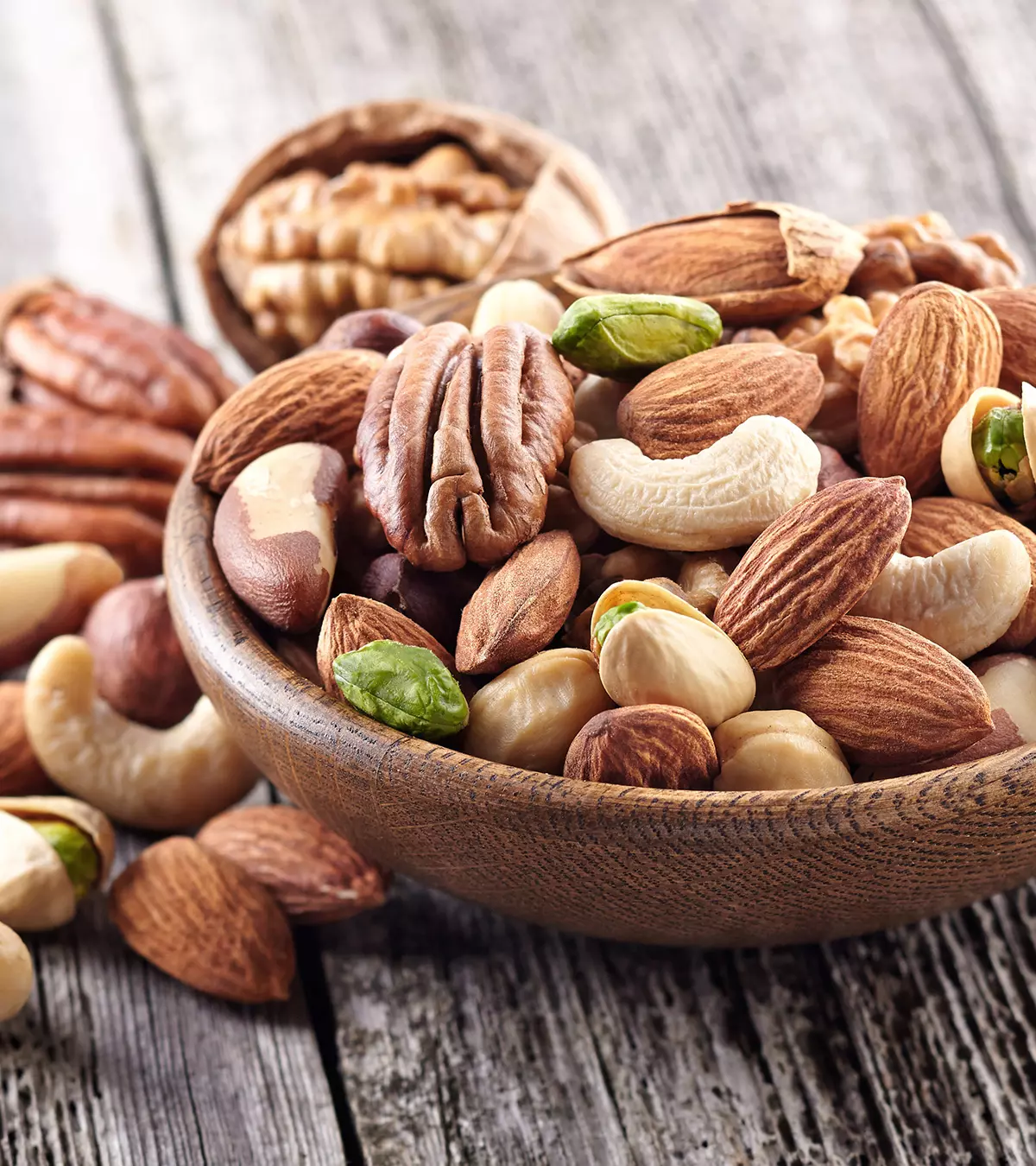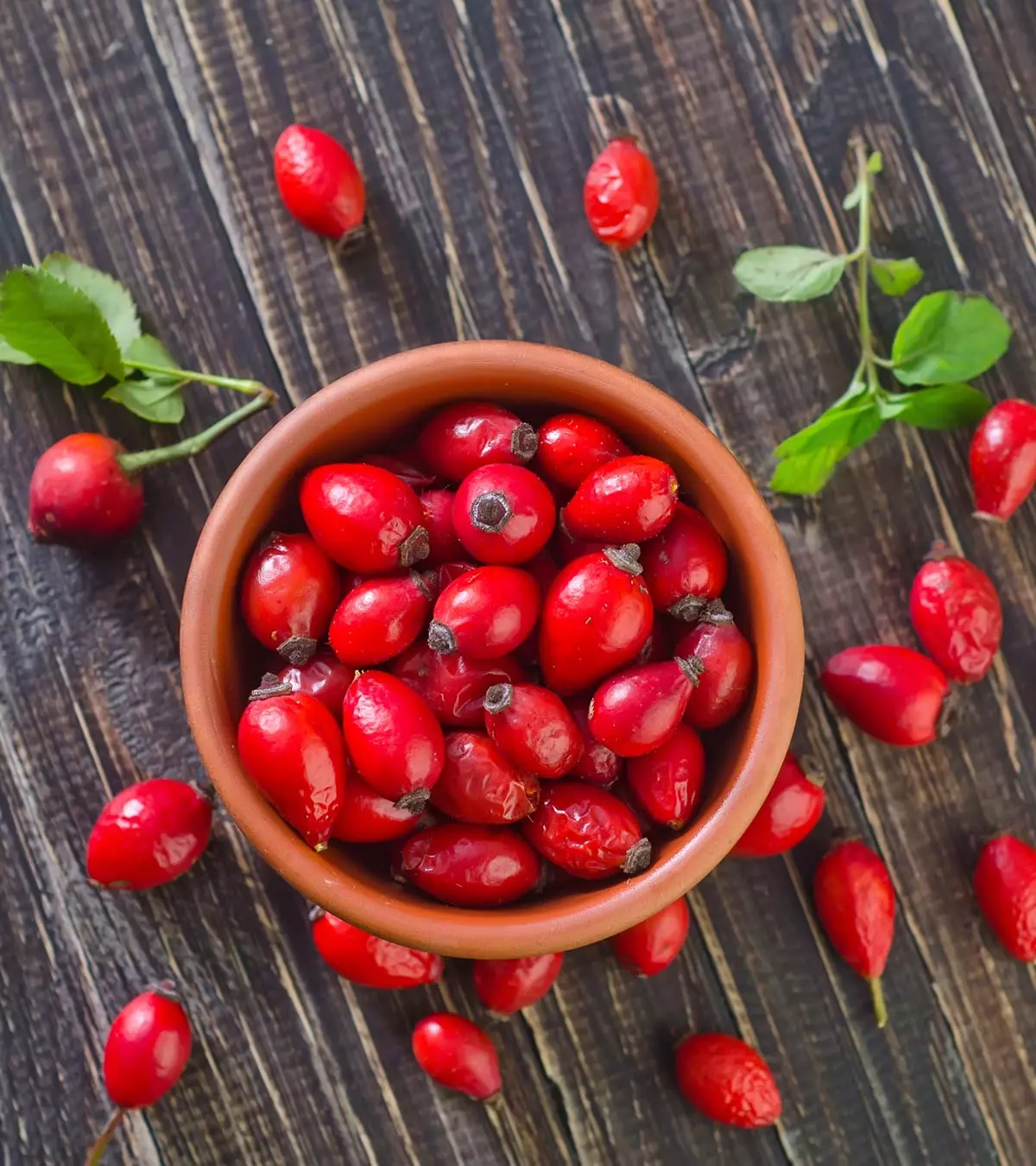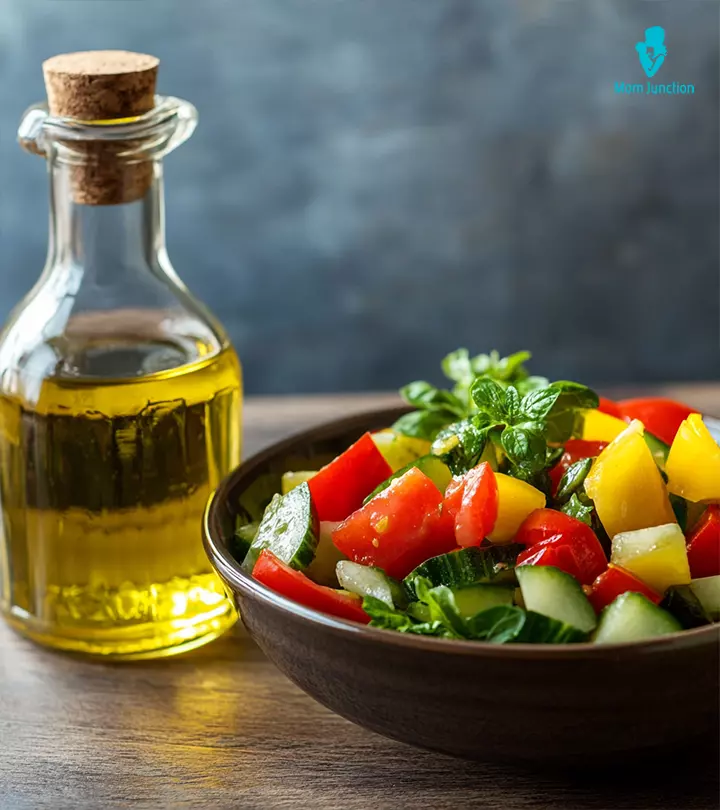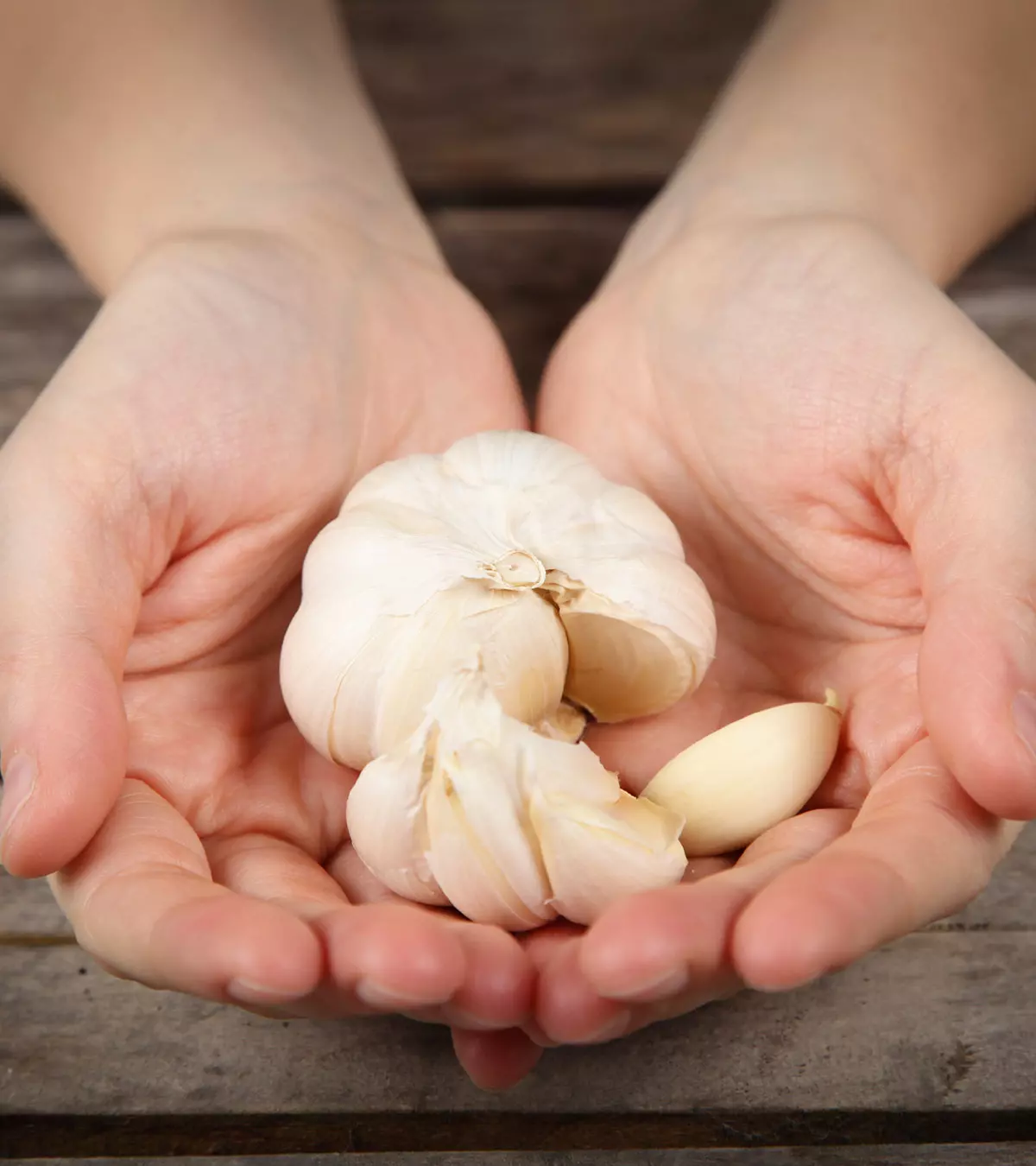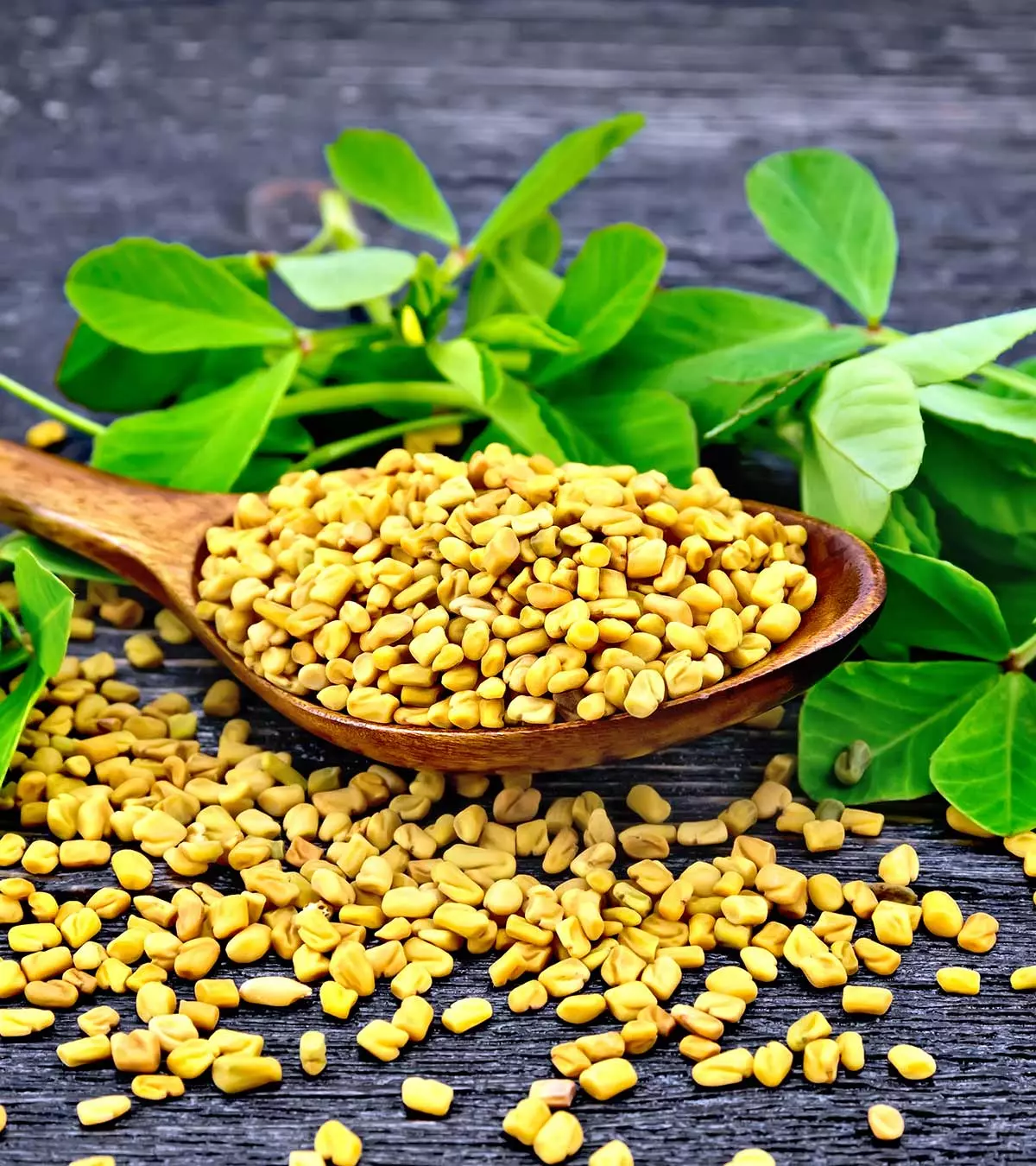
Image: iStock
Pomegranate is a popular semi-tropical fruit native to Iraq. This old fruit is famous for its nutritional profile and antioxidant properties that can promote health which is why it is also considered a superfood. But while pomegranate for babies seems a good choice, feeding it in age-appropriate ways is necessary to avert feeding issues such as gagging and choking.
Read on to learn about the right age when babies can eat a pomegranate, its possible health benefits, and precautions to observe when feeding this fruit to babies.
Key Pointers
- Small amounts of freshly prepared pomegranate juice can be safely given to babies after six months of age.
- Pomegranate has beneficial properties that can soothe symptoms related to fevers, digestive problems, and inflammation in babies.
- The four-day rule may be used to introduce the juice to the baby and check for sensitivities or allergies.
- Overconsumption of pomegranate juice may cause diarrhea, weight gain, and dental issues.
- Before giving pomegranate juice to the baby, it is essential to strain it to remove seeds and prevent choking.
Is Pomegranate Good For Babies?

Yes! You can give the juicy pomegranate to your baby after the baby turns six months old, but only in the form of fresh juice. While you feed juice, make sure it has no added sugars or artificial sweetners as fruit juice is not recommended for babies under one year of age (1). If your baby is under one year, it is wise to consult your pediatric nutritionist to decide on a safe intake limit for your baby.
Note: Once your child grows a bit, you can serve the fruit pulp instead of juice. But make sure it is seedless as pomegranate seeds are a potential choking hazard.
Nutritional Value Of Pomegranate
The edible part of the pomegranate consists of 85% water. It also has fair amounts of micronutrients and bioactive compounds such as phenolics and flavonoids (2). Below is a detailed list of nutrients that pomegranate has versus the recommended amounts for babies on a per-day basis.
| Name | Amount | RDA |
|---|---|---|
| Water | 120g | – |
| Energy | 128Kcal | – |
| Protein | 2.57g | – |
| Carbohydrate, by difference | 28.8g | – |
| Fiber, total dietary | 6.16g | – |
| Sugars, total including NLEA | 21.1g | – |
| Calcium, Ca | 15.4mg | 270 mg (7-12 months) |
| Magnesium, Mg | 18.5mg | 75mg (7-12 months) |
| Phosphorus, P | 55.4mg | 275mg (7-12 months) |
| Potassium, K | 363mg | 700mg (7-12 months) |
| Sodium, Na | 4.62mg | 200mg (7-12 months) |
| Vitamin C, total ascorbic acid | 15.7mg | 20mg (7-12months) |
| Folate, total | 58.5µg | 32µg (7-12 months) |
| Choline, total | 11.7mg | 150mg (7-12months) |
| Vitamin K (phylloquinone) | 25.3µg | 10µg (7-12months) |
| Source: Nutrient Values (3), RDA (4) |
Research studies show that pomegranate has certain bioactive compounds that possess the potential antioxidant, anti-inflammatory, and anticarcinogenic effects useful to promote health (5).
Health Benefits Of Pomegranate For Babies

Here are some ways in which pomegranate can help your baby.
- Nutrition: Pomegranate is a nutritious fruit with many vitamins, particularly vitamins C and E. It is also a good source of minerals such as folate, fiber, iron, and potassium (3). Proper infant nutrition is crucial for their healthy development, and these powerful nutrients possess properties that protect your baby from diseases.
- Inflammation: A study has shown that extracts from the pomegranate have the potential to reduce inflammation caused by various types of bacterial infections. This medicinal property of pomegranate is attributed to ellagitannins, an antioxidant found in pomegranate (6).
Another research study published in the Journal of Food and Nutrition has demonstrated the potential effect of fresh pomegranate juice on multidrug-resistant bacterial strains (7).
- Digestive problems: Pomegranate has been used in traditional medicine practices. One such medicinal use is the treatment of digestive issues such as constipation, diarrhea, and vomiting.
Pomegranate juice is considered effective in treating vomiting and counteracting the bacteria that cause dysentery and diarrhea in babies. However, there are limited clinical studies to substantiate the belief (8).
Pomegranate is also considered as a natural constipation reliever. One pomegranate gives approximately six grams of dietary fiber. This amount is reasonable to help combat baby’s constipation. However, there is limited clinical evidence to validate the belief.
- Intestinal worms: These parasites reside in the small or large intestine and multiply by feeding on nutrients. As per Ayurveda, pomegranate fruit has anthelmintic properties that can help kill intestinal worms (9). Research conducted by multiple institutes demonstrated that when tested in a laboratory, pomegranate extract showed promising effects in killing parasites. The concentration of 10 mg/mL significantly reduced the number of adult parasites over a period of 7 hours, similar to the effects of a commonly used antiparasitic medication. However, the medication was more effective and killed all parasites within 5 hours at a lower 0.25 mg/mL concentration.
- Fevers: Pomegranate juice is believed to effectively treat fever in babies and boost their immunity. The juice is not only believed to control fever but also replete the nutrients lost due to fever. The supporting clinical studies are few. However, its efficacy to restore nutrient balance after the fever is documented (10).

 Point to consider
Point to consider- Skin health: Pomegranates may have the potential to protect a baby’s skin from damage. Studies reveal that pomegranate may have photo-chemopreventive effects, inhibiting UVB-mediated DNA and protein damage. Phenolics present in pomegranate may serve as natural antioxidants, making them valuable for cosmeceutical applications that promote skin health. An in vitro study demonstrated the protective effects of pomegranate phenolics against oxidative stress and cytotoxicity. This implies that incorporating pomegranate-based products, such as juice, extract, and oil derived from the by-products of juice production, can contribute to the well-being of a baby’s skin (11).
- Heart health: Whether consumed as whole fruit, in juice form, or as compounds integrated into various food products, pomegranate has demonstrated significant health benefits. Regular consumption has been associated with potentially protective effects against various diseases, such as diabetes, obesity, and even cardiovascular diseases (11). Thus, adding this fruit to a baby’s diet can be a simple yet effective way to promote a healthy heart.
The health benefits of pomegranate are promising, making it a viable option to introduce as one of the first solid foods in a baby’s diet and for parents considering baby-led weaning. However, some precautions are a must before you do so.
Precautions To Take While Giving Pomegranate To Babies

Some things to consider before feeding your little one pomegranate pulp are:
- Make sure that you don’t give seeds to your baby. Pomegranate seeds pose a choking hazard.
- Do not grind the white skin of the pomegranate while making the juice. It will lend a sour flavor to the juice.
- Overconsumption of fruit juice can lead to weight gain and dental problems.
 Quick tip
Quick tip- Offer the juice sparingly as infants receive most of their nutrients from the mother’s milk. 4oz a day is more than enough for an 8-month-old baby. Excess consumption can cause diarrhea.
- Do not mix pomegranate with any other fruit or vegetable. Always follow the four-day rule before introducing any food into your baby’s diet. And keep an eye for the allergic reactions.
- If you see any allergic reaction or signs of intolerance, discontinue feeding immediately and consult a pediatrician promptly.
With all the precautions followed, you can safely introduce pomegranate or pomegranate juice to your baby.
How To Make Pomegranate Juice For Babies?

You can easily make pomegranate juice at home by following these simple steps:
- Take out all the seeds from the pomegranate and blend in a juicer. Krista, a mom and blogger, suggests an effective method. She says, “Turn it over a bowl and whack it with a wooden spoon until all of the seeds fall out. I love this method because it is the fastest and easiest (i). This technique not only makes the process faster but also adds a fun element, perfect for involving your little one.
- Do not add extra sugar to the juice.
- Strain the juice before serving to your baby, and start with small amounts to allow their taste buds and digestive system to adapt when introducing new foods or juices.
Do consider consulting your child’s pediatrician about feeding them pomegranate juice, particularly if they are below the age of one.
Frequently Asked Questions
1. Is pomegranate good for colds for babies?
Evidence suggests that pomegranate extracts may have antiviral effects against certain viruses, such as the influenza virus (causative agent of the flu). However, there is a lack of evidence to prove the role of pomegranates in treating colds (6).
2. How do you puree pomegranate for baby food?
Giving pomegranate seeds to babies is not advisable as they may cause choking hazards. Nevertheless, for older infants, you may crush or flatten the seeds and combine them with another soft fruit (such as mashed banana) to make a fruit puree for babies. Homemade baby food/ puree is an excellent way to safely provide essential nutrients to your little one.
3. How can pomegranates help with brain development in babies?
Pomegranate contains several nutrients that could contribute to overall well-being, including optimum cognitive health. Besides, emerging evidence suggests that certain dietary components, like polyphenols in pomegranate, may contribute to brain wellness and cognitive outcomes (12).
4. Can pomegranate juice help with hydration in babies?
Fruit juices are majorly composed of water; however they are low in nutritional content and have low effectiveness against dehydration. Therefore, while juice may be given to children, they also require adequate water intake for proper hydration.
Pomegranate for babies is totally safe to be given as juice once they reach the age of six months. However, make sure the juice has no artificial or added sweeteners that could affect your baby’s health adversely. Pomegranate is a nutrient-rich fruit with potential antioxidant, anti-inflammatory, and anticarcinogenic properties to promote your baby’s good health. It can also be used to treat gastric disorders in infants. Nevertheless, when offering pomegranate to your newborn, make sure the pulp is free of seeds and limit their intake.
Infographic: Precautionary Measures When Feeding Pomegranate To Babies
Pomegranates are semi-tropical tart fruits found all over the world. They have a high nutritional value and antioxidant properties. Look at the infographic below to learn some safety precautions you should take when feeding your babies this delicious fruit. Illustration: Momjunction Design Team
Illustration: Health Benefits Of Pomegranate For Babies
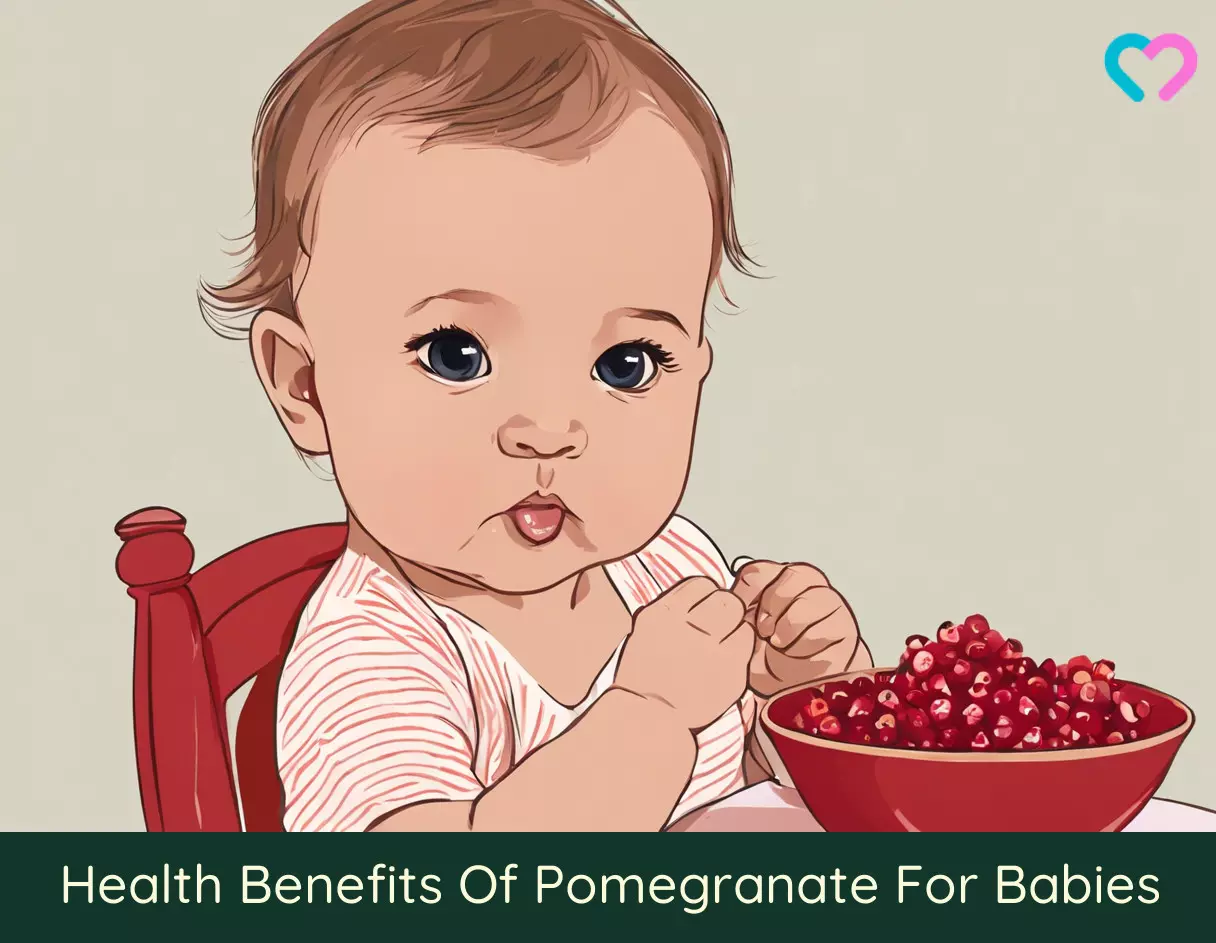
Image: Stable Diffusion/MomJunction Design Team
Indulge your little one with delectable and nutrient-rich pomegranate juice! Learn the recipe of preparing simple, yet healthy recipes tailored for babies aged 6 months and older and transform mealtimes into delightful and flavorsome experiences.
Personal Experience: Source
MomJunction articles include first-hand experiences to provide you with better insights through real-life narratives. Here are the sources of personal accounts referenced in this article.
i. Freeing the seed; A review of pomegranate seed removal methods and a few of my favorite pomegranate recipes;https://cookingwithkrista.blogspot.com/2014/11/freeing-seed-review-of-pomegranate-seed.html
References
1. American Academy of Pediatrics Recommends No Fruit Juice For Children Under 1 Year; American Academy of Pediatrics
2. Sreeja Sreekumar et al.; Pomegranate Fruit as a Rich Source of Biologically Active Compounds; Hindawi
3. Pomegranate, raw, (341622); Food Data Central; USFDA
4. Feeding and nutrition of infants and young children; WHO
5. Aida Zarfeshany et al.; Potent health effects of pomegranate; National Center For Biotechnology Information
6. Amy B. Howell and Doris H. D’Souza; The Pomegranate: Effects on Bacteria and Viruses That Influence Human Health; Hindawi
7. Gabriel Betanzos-Cabrera et al.; Antibacterial activity of fresh pomegranate juice against clinical strains of Staphylococcus epidermidis; National Center For Biotechnology Information
8. Elisa Colombo et al.; A Review on the Anti-Inflammatory Activity of Pomegranate in the Gastrointestinal Tract; National Center For Biotechnology Information
9. Rama Aggarwal and Upma Bagai; Effect of Punica granatum fruit peel on glucose-6-phosphate dehydrogenase and malate dehydrogenase in amphistome Gastrothylax indicus; National Center For Biotechnology Information
10. Debjit Bhowmik et al.; Medicinal Uses of Punica granatum and Its Health Benefits; Journal of Pharmacognosy and Phytochemistry
11. Panagiotis Kandylis and Evangelos Kokkinomagoulos; Food Applications and Potential Health Benefits of Pomegranate and its Derivatives; MDPI (2020)
12. Diep H. Ha et al.; Factors Influencing Early Feeding of Foods and Drinks Containing Free Sugars—A Birth Cohort Study; International journal of environmental research and public health (2017)
13. Yang, W., Cui, K., Li, X. et al.; Effect of Polyphenols on Cognitive Function: Evidence from Population-based Studies and Clinical Trials; National Library of Medicine (2021)
Community Experiences
Join the conversation and become a part of our nurturing community! Share your stories, experiences, and insights to connect with fellow parents.
Read full bio of Jyoti Benjamin
Read full bio of Swati Patwal
Read full bio of Rohit Garoo
Read full bio of Ghazia Shah








